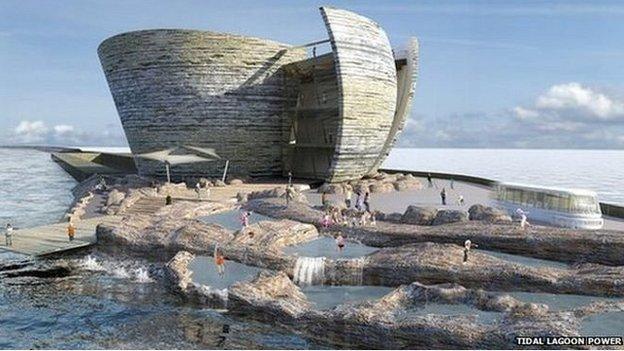Is the tide going out on the Swansea lagoon project?
- Published
- comments

Tidal power: the size of the subsidy demanded seems to have cooled the prime minister's enthusiasm
I missed this on Tuesday due to a deadline clash with a Westminster Hall debate so I tip my hat to for spotting the prime minister's "reduced" enthusiasm for the Swansea tidal lagoon project.
David Cameron was giving evidence to the liaison committee, which is made up of the chairs of select committees at Westminster. Neil Parish, who chairs the environment, food and rural affairs committee, put Mr Cameron on the spot.
Neil Parish: "Are you very keen on tidal power? We have the Bristol channel, which has the second highest rise and fall in the world. We could increase our amount of renewable energy without taking good quality land to put solar panels on it."
David Cameron: "Instinctively, I can see the strength of the argument for tidal power, because one of the problems with renewables is whether they can provide base-load power.
"Nuclear can. Wind cannot, because it is intermittent. But tidal, because the tide is always going in or out, can provide base-load power. The problem with tidal power, simply put, is that at the moment we have not seen any ideas come forward that can hit a strike price in terms of pounds per megawatt-hour that is very attractive. That is the challenge for tidal.
"Maybe they can come up with something. They are very long-term schemes with big investments up front, and they can last for many, many years, but right now my enthusiasm is reduced slightly by the fact that the cost would be quite high."
'Limitless'
Neil Parish: "The tidal scheme in Swansea definitely has a very high capital cost, but if you put that over a great number of years you will find that the power is naturally limitless and the cost is inexpensive."
Mr Cameron: "Obviously we have to look at the figures as they come out. As I have said, tidal power has got the permanence to it. There are important economic benefits in terms of urban renewal and all the rest of it. I totally see all those arguments and have seen some exciting prospects, but as I said, you have to come back to the question of what the action I take will do to the security of supply and the cost of supply. In all the arguments about renewables, you always have to ask yourself what that will put on a household bill."
During the later days of the coalition government, the Conservatives and Liberal Democrats squabbled over which of them was the driving forced behind support for it within government.
Then the election intervened and, returned to power, it dawned on the Conservatives just how expensive (much more than nuclear, I'm told) the project would be. It wouldn't be the first policy to be embraced enthusiastically by a party before an election only to be rejected afterwards.
The Lib Dems have accused their former coalition partners of "playing games" over the project. Peter Black AM told me: "A new, more affordable strike price has been submitted by the company. My view is that it's more realistic and should be agreed."
The project was raised during in the Commons by the former Welsh Secretary Cheryl Gillan. She asked her successor-but-one Stephen Crabb: "When can we expect to hear what financial support will be forthcoming from the Government so that this exciting project can proceed without delay?"
Stephen Crabb said she was right. "The Swansea tidal lagoon proposition is very exciting and commands wide support across the business community in Wales, but we also need to recognise that the project is asking for a very significant level of public subsidy and intervention. It is absolutely right that the Treasury and the Department of Energy and Climate Change should conduct very robust due diligence in making sure that such projects will deliver value for the taxpayer."
is confident it can reach a deal at a price which it believes will make the project viable.